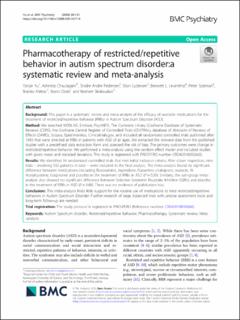| dc.contributor.author | Yu, Yanjie | |
| dc.contributor.author | Chaulagain, Ashmita | |
| dc.contributor.author | Pedersen, Sindre Andre | |
| dc.contributor.author | Lydersen, Stian | |
| dc.contributor.author | Leventhal, Bennett | |
| dc.contributor.author | szatmari, peter | |
| dc.contributor.author | Aleksic, Branco | |
| dc.contributor.author | ozaki, norio | |
| dc.contributor.author | Skokauskas, Norbert | |
| dc.date.accessioned | 2021-01-13T08:33:52Z | |
| dc.date.available | 2021-01-13T08:33:52Z | |
| dc.date.created | 2021-01-10T16:34:04Z | |
| dc.date.issued | 2020 | |
| dc.identifier.issn | 1471-244X | |
| dc.identifier.uri | https://hdl.handle.net/11250/2722689 | |
| dc.description.abstract | Background: This paper is a systematic review and meta-analysis of the efficacy of available medications for the treatment of restricted/repetitive behavior (RRBs) in Autism Spectrum Disorder (ASD). Method: We searched MEDLINE, Embase, PsycINFO, The Cochrane Library (Cochrane Database of Systematic Reviews (CDRS), the Cochrane Central Register of Controlled Trials (CENTRAL), database of Abstracts of Reviews of Effects (DARE)), Scopus, Epistimonikos, Clinicaltrials.gov, and included all randomized controlled trials published after 1993 that were directed at RRBs in patients with ASD of all ages. We extracted the relevant data from the published studies with a predefined data extraction form and assessed the risk of bias. The primary outcomes were change in restricted/repetitive behavior. We performed a meta-analysis using the random effect model and included studies with given mean and standard deviation. This study is registered with PROSPERO number CRD42018092660). Results: We identified 14 randomized controlled trials that met initial inclusion criteria. After closer inspection, nine trials – involving 552 patients in total – were included in the final analysis. The meta-analysis found no significant difference between medications (including fluvoxamine, risperidone, fluoxetine, citalopram, oxytocin, NAcetylcysteine, buspirone) and placebo in the treatment of RRBs in ASD (P = 0.20). Similarly, the sub-group metaanalysis also showed no significant difference between Selective Serotonin Reuptake Inhibitor (SSRIs) and placebo in the treatment of RRBs in ASD (P = 0.68). There was no evidence of publication bias. Conclusion: This meta-analysis finds little support for the routine use of medications to treat restricted/repetitive behaviors in Autism Spectrum Disorder. Further research of large, balanced trials with precise assessment tools and long-term follow-up are needed. | en_US |
| dc.language.iso | eng | en_US |
| dc.publisher | BMC | en_US |
| dc.rights | Navngivelse 4.0 Internasjonal | * |
| dc.rights.uri | http://creativecommons.org/licenses/by/4.0/deed.no | * |
| dc.title | Pharmacotherapy of restricted/repetitive behavior in autism spectrum disorder:a systematic review and meta-analysis | en_US |
| dc.type | Peer reviewed | en_US |
| dc.type | Journal article | en_US |
| dc.description.version | publishedVersion | en_US |
| dc.source.volume | 20 | en_US |
| dc.source.journal | BMC Psychiatry | en_US |
| dc.identifier.doi | 10.1186/s12888-020-2477-9 | |
| dc.identifier.cristin | 1868346 | |
| dc.description.localcode | © The Author(s). 2020 Open Access This article is distributed under the terms of the Creative Commons Attribution 4.0 International License (http://creativecommons.org/licenses/by/4.0/), which permits unrestricted use, distribution, and reproduction in any medium, provided you give appropriate credit to the original author(s) and the source, provide a link to the Creative Commons license, and indicate if changes were made. The Creative Commons Public Domain Dedication waiver (http://creativecommons.org/publicdomain/zero/1.0/) applies to the data made available in this article, unless otherwise stated. | en_US |
| cristin.ispublished | true | |
| cristin.fulltext | original | |
| cristin.qualitycode | 1 | |

